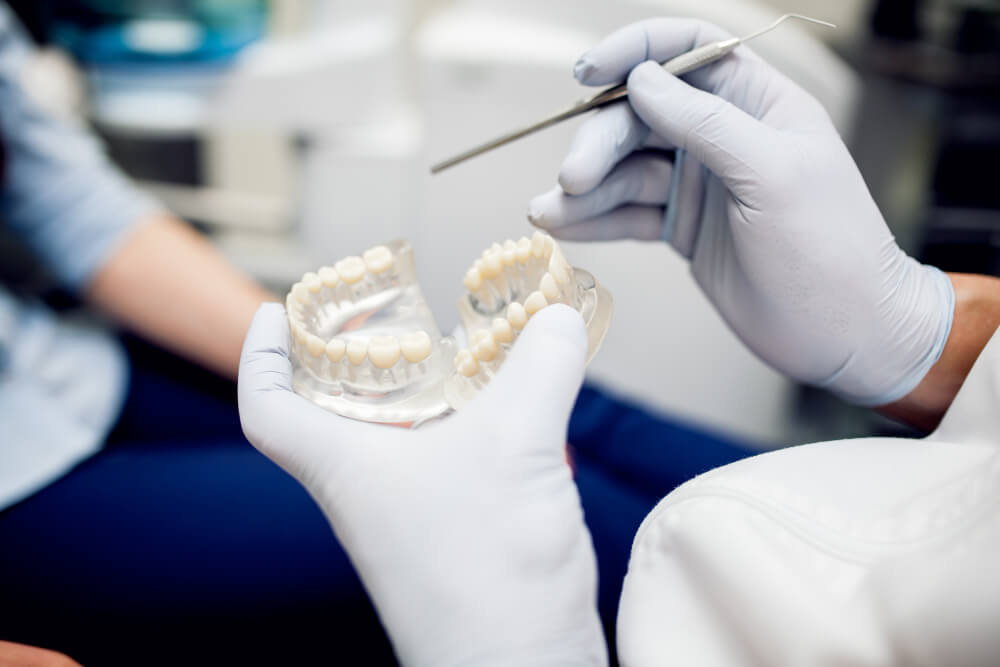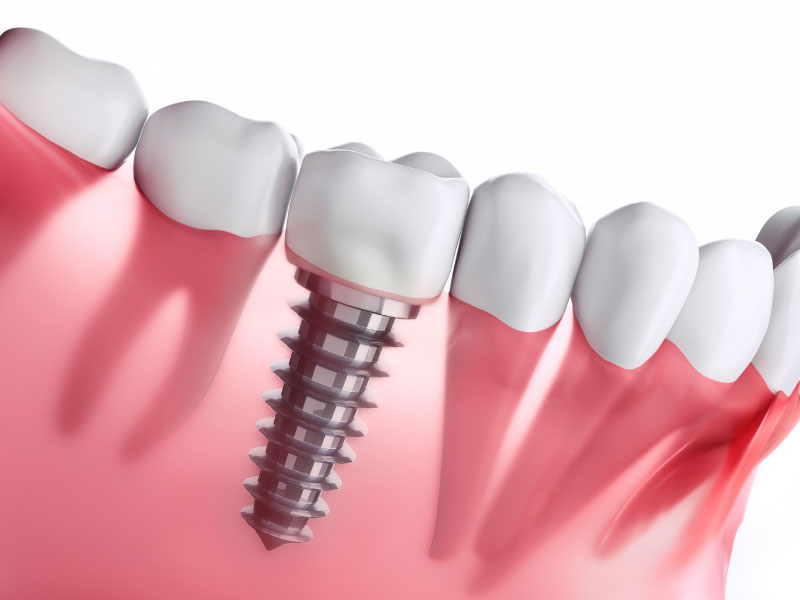Losing a tooth isn’t just a cosmetic concern—it can affect your confidence, speech, and ability to enjoy your favorite foods.
Whether you’ve lost teeth due to injury, decay, or aging, finding the right replacement solution is essential for both your oral health and overall well-being.
Many people turn to traditional options like dentures or bridges, but these come with limitations, from discomfort to the need for frequent replacements.
That’s where dental implants stand out. Unlike removable alternatives, dental implants are a permanent, natural-looking solution that restores both the function and appearance of real teeth.
If you’re wondering, Are dental implants painful? How long do they last? Are they worth the cost?—you’re not alone.
This guide will answer these common questions and walk you through everything you need to know about dental implants, from the procedure to long-term benefits.
By the end, you’ll have a clear understanding of whether implants are the right choice for you.

Are Dental Implants Right for You?
If you’re missing one or more teeth, you might be wondering: Are dental implants worth it? How long do they last? Will they feel natural? These are common concerns, and the good news is that achieving long-term results with dental implants , is possible, giving you a solution that looks, feels, and functions like real teeth.
Missing teeth can affect more than just your smile. They can impact your ability to chew, alter your speech, and even lead to bone loss in the jaw over time.
Traditional dentures and bridges can help, but they don’t offer the same stability and long-term benefits as implants.
Let’s break down why dental implants have become the gold standard for tooth replacement.
What Are Dental Implants?
Dental implants are small titanium posts that act as artificial tooth roots.
They are surgically placed into the jawbone and provide a strong foundation for replacement teeth, such as crowns, bridges, or dentures.
Over time, the implants fuse with the bone through a process called osseointegration, creating a secure and durable fit.
Components of a Dental Implant
A dental implant consists of three main parts:
- The Implant Post – A titanium screw that integrates with your jawbone, serving as a new root for your tooth.
- The Abutment – A small connector that attaches to the implant post and holds the crown.
- The Crown – The visible part of the tooth, custom-made to match your natural teeth.
Unlike other tooth replacement options, implants don’t just sit on the surface of your gums—they become a part of your bone structure, ensuring a more natural function and feel.
Why Choose Dental Implants Over Other Options?
Many people wonder how implants compare to dentures and bridges.
Here’s a breakdown of the advantages:
- Long-lasting – With proper care, implants can last a lifetime, unlike bridges or dentures that may need replacement every 5-10 years.
- Natural feel and function – They allow you to eat, speak, and smile without worry.
- Prevents bone loss – When you lose a tooth, the jawbone in that area starts to shrink. Implants stimulate the bone, preventing deterioration.
- No slipping or discomfort – Unlike dentures, implants are securely anchored, eliminating the need for adhesives.
- Preserves surrounding teeth – Traditional bridges require grinding down neighboring teeth for support. Implants don’t affect adjacent teeth.
- Better oral health – Implants make it easier to maintain proper hygiene since they function just like natural teeth.
Who Is a Good Candidate for Dental Implants?
Most people with healthy gums and enough jawbone to support an implant are good candidates.
However, certain factors can impact eligibility:
- Jawbone Density – If you’ve experienced bone loss, a bone graft may be needed before placing an implant.
- Gum Health – Healthy gums are crucial for implant success. If you have gum disease, it must be treated first.
- Overall Health – Chronic conditions like diabetes and osteoporosis can affect healing, but they don’t necessarily rule out implants.
- Smoking – Smoking can slow healing and increase the risk of implant failure, though it’s still possible to get implants with proper care.
Your dentist will assess these factors during your consultation and recommend the best approach for your situation.
What to Expect: The Dental Implant Process
Getting dental implants is a multi-step process that typically takes several months.
Here’s what to expect:
Step 1: Consultation & Planning
Your dentist will conduct a thorough examination, including X-rays or a CT scan, to assess your bone structure and plan your treatment.
Step 2: Tooth Extraction (If Needed)
If the damaged tooth is still in place, it will be extracted before the implant procedure.
Step 3: Bone Grafting (If Required)
If your jawbone lacks the necessary density, a bone graft may be performed to strengthen it.
This step can add several months to the process as healing must occur before the implant is placed.
Step 4: Implant Placement
The titanium implant is surgically inserted into the jawbone.
After placement, a healing period of 3-6 months allows the implant to integrate with the bone.
Step 5: Abutment Placement
Once the implant has fused with the jawbone, the abutment is attached.
This small connector piece will hold the crown in place.
Step 6: Crown Placement
A custom-made crown is attached to the abutment, completing your new tooth.
How Much Do Dental Implants Cost?
The cost of dental implants varies based on several factors:
- Number of implants needed
- Location of the implant (front teeth are often more complex to replace than molars)
- Bone grafting or other preparatory procedures
- Materials used for the crown (porcelain vs. zirconia)
On average, a single dental implant can cost between $3,000 and $5,000.
While this is a significant investment, the long-term benefits make it a cost-effective solution.
Caring for Your Dental Implants
Taking care of dental implants is similar to caring for natural teeth:
- Brush and floss daily – Keeping your gums and surrounding teeth healthy is key to implant longevity.
- Regular dental check-ups – Visit your dentist for professional cleanings and exams.
- Avoid smoking and excessive alcohol consumption – These habits can increase the risk of implant failure.
- Use a soft-bristle toothbrush and non-abrasive toothpaste – This helps protect the implant and surrounding gum tissue.

Real Stories: Life After Dental Implants
Many patients report a significant boost in confidence and quality of life after getting dental implants.
Here’s one inspiring story:
Sarah’s Experience
Sarah lost a front tooth in a biking accident. At first, she was hesitant about getting an implant, worried about the procedure and cost.
After speaking with her dentist and learning about the long-term benefits, she decided to go for it.
Now, she says, “I was self-conscious about my smile for years. Getting an implant changed everything—I finally feel like myself again.”
Common Questions About Dental Implants
Do dental implants hurt?
Most patients report minimal discomfort. The procedure is done under local anesthesia, and post-surgery pain is usually manageable with over-the-counter medication.
How long do dental implants last?
With proper care, implants can last a lifetime. The crown may need replacement after 10-15 years due to normal wear.
Can I eat normally with dental implants?
Yes! Unlike dentures, implants allow you to eat all your favorite foods without restrictions.
Are dental implants covered by insurance?
Some insurance plans cover part of the cost, but coverage varies. Check with your provider for details.
Conclusion
Dental implants are more than just a cosmetic fix—they’re a long-term investment in your oral health, confidence, and quality of life.
Unlike traditional dentures or bridges, implants offer a permanent solution that feels and functions like natural teeth, allowing you to eat, speak, and smile without worry.
If you’ve been struggling with missing teeth, now is the time to explore your options.
A consultation with a qualified dentist can help determine whether implants are the right fit for you.
With proper care, they can last a lifetime, making them one of the most effective solutions for tooth loss.
Still have questions? Don’t hesitate to reach out to a dental professional or share your thoughts in the comments.
If you found this guide helpful, pass it along to someone who might benefit from it!

